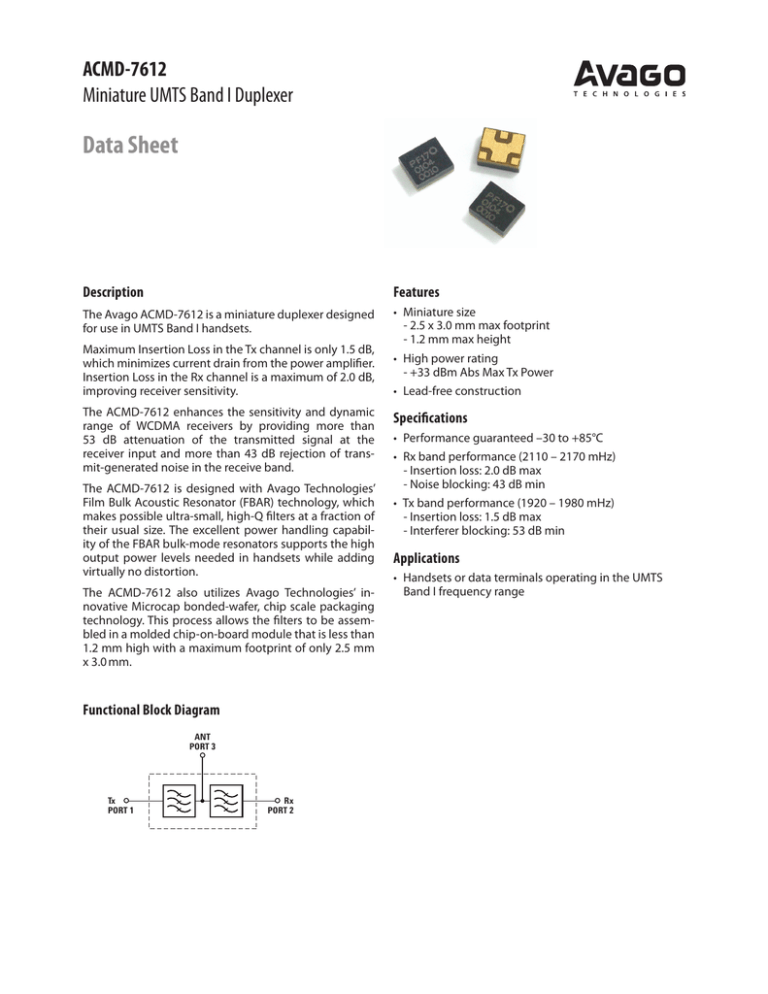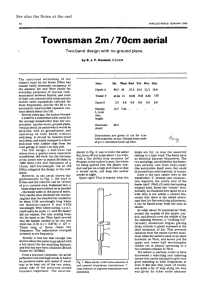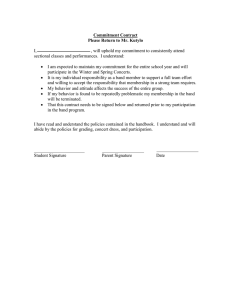
ACMD-7612
Miniature UMTS Band I Duplexer
Data Sheet
Description
Features
The Avago ACMD-7612 is a miniature duplexer designed
for use in UMTS Band I handsets.
• Miniature size
- 2.5 x 3.0 mm max footprint
- 1.2 mm max height
• High power rating
- +33 dBm Abs Max Tx Power
• Lead-free construction
Maximum Insertion Loss in the Tx channel is only 1.5 dB,
which minimizes current drain from the power amplifier.
Insertion Loss in the Rx channel is a maximum of 2.0 dB,
improving receiver sensitivity.
The ACMD-7612 enhances the sensitivity and dynamic
range of WCDMA receivers by providing more than
53 dB attenuation of the transmitted signal at the
receiver input and more than 43 dB rejection of transmit-generated noise in the receive band.
The ACMD-7612 is designed with Avago Technologies’
Film Bulk Acoustic Resonator (FBAR) technology, which
makes possible ultra-small, high-Q filters at a fraction of
their usual size. The excellent power handling capability of the FBAR bulk-mode resonators supports the high
output power levels needed in handsets while adding
virtually no distortion.
The ACMD-7612 also utilizes Avago Technologies’ innovative Microcap bonded-wafer, chip scale packaging
technology. This process allows the filters to be assembled in a molded chip-on-board module that is less than
1.2 mm high with a maximum footprint of only 2.5 mm
x 3.0 mm.
Functional Block Diagram
ANT
PORT 3
Tx
PORT 1
Rx
PORT 2
Specifications
• Performance guaranteed –30 to +85°C
• Rx band performance (2110 – 2170 mHz)
- Insertion loss: 2.0 dB max
- Noise blocking: 43 dB min
• Tx band performance (1920 – 1980 mHz)
- Insertion loss: 1.5 dB max
- Interferer blocking: 53 dB min
Applications
• Handsets or data terminals operating in the UMTS
Band I frequency range
ACMD-7612 Specifications, Z0 = 50 Ω, TC[1] as Indicated
–30 to +85°C[2]
Symbol
Parameter
Units
Min
Typ[3]
Max
Antenna Port to Receive Port
S23
Insertion Loss in Receive Band (2110 – 2170 MHz)
dB
1.1
2.0
∆S23
Ripple (p-p) in Receive Band
dB
0.6
1.0
∆S23
Ripple (p-p) in Any 5 MHz Channel within Receive Band
dB
–
0.5
S22
Return Loss of Receive Port in Receive Band
dB
10
16
S23
Attenuation 0 – 1900 mHz
dB
30
50
S23
Attenuation in Transmit Band (1920 – 1980 mHz)
dB
53
61
S23
Attenuation in Bluetooth Band (2400 – 2500 mHz)
dB
40
54
Transmit Port to Antenna Port
S31
Insertion Loss in Transmit Band (1920 – 1980 mHz) -30° to +25°C
dB
1.1
1.5
S31
Insertion Loss in Transmit Band (1920 – 1980 mHz) +25° to +85°C
dB
1.1
1.6
∆S31
Ripple (p-p) in Transmit Band
dB
0.4
1.0
∆S31
Ripple (p-p) in Any 5 mHz Channel within Transmit Band
dB
–
0.5
S11
Return Loss of Transmit Port in Transmit Band
dB
10
20
S31
Attenuation 0 – 1800 mHz
dB
30
44
S31
Attenuation in Receive Band (2110 – 2170 mHz)
dB
41
52
S31
Attenuation in Bluetooth Band (2400 – 2500 mHz)
dB
25
31
S31
Attenuation in Transmit 2nd Harmonic Band (3840 – 3960 mHz)
dB
25
36
S31
Attenuation in Transmit 3rd Harmonic Band (5760 – 5940 mHz)
dB
15
17
dB
10
17
Antenna Port
S33
Return Loss of Antenna Port in Transmit and Receive Bands
Isolation Transmit Port to Receive Port
S21
Tx-Rx Isolation in Transmit Band (1920 – 1980 mHz)
dB
53
62
S21
Tx-Rx Isolation in Receive Band (2110 – 2170 mHz)
dB
43
52
Notes:
1. TC is the case temperature and is defined as the temperature of the underside of the duplexer where it makes contact with the circuit board.
2. Specifications guaranteed over the given temperature range (unless otherwise noted) with the input power to the Tx port equal to or less than
+29 dBm over all Tx frequencies.
3. Typical data is the arithmetic mean value of the parameter over its indicated frequency range at the specified temperature. Typical values may
vary from part to part and over time.
Absolute Maximum Ratings[1]
Parameter
Unit
Value
Storage Temperature
°C
-65 to +125
Maximum RF Input Power to Tx Port
dBm
+33
Parameter
Unit
Value
Operating Temperature, TC[3] , Tx Power ≤ 29 dBm
Operating Temperature, TC[3] , Tx Power ≤ 30 dBm
°C
-40 to +100
°C
-40 to +85
Maximum Recommended Operating Conditions[2]
Notes:
1. Operation in excess of any one of these conditions may result in permanent damage to the device.
2. The device will function over the recommended range without degradation in reliability or permanent change in performance, but is not
guaranteed to meet electrical specifications.
3. TC is defined as case temperature, the temperature of the underside of the duplexer where it makes contact with the circuit board.
0
0
-0.5
-0.5
INSERTION LOSS (dB)
INSERTION LOSS (dB)
ACMD-7612 Typical Performance at TC = 25°C
-1.0
-1.5
-2.0
-2.5
1920
-1.0
-1.5
-2.0
1930
1940
1950
1960
1970
-2.5
2110
1980
2120
2130
FREQUENCY (MHz)
0
2170
-10
INSERTION LOSS (dB)
RETURN LOSS (dB)
2160
0
-5
-10
Tx
Rx
-15
-20
Tx
Rx
-20
-30
-40
-50
1900
2000
2100
FREQUENCY (MHz)
Figure 3. Tx and Rx port return loss
2150
Figure 2. Rx band insertion loss
Figure 1. Tx band insertion loss
-25
1800
2140
FREQUENCY (MHz)
2200
2300
-60
1800
1900
2000
2100
FREQUENCY (MHz)
Figure 4. Tx rejection in Rx band and Rx rejection in Tx band
2200
2300
0
-5
-50
RETURN LOSS (dB)
INSERTION LOSS (dB)
-40
-60
-70
-80
1800
-10
-15
-20
1900
2000
2100
2200
-25
1800
2300
1900
2000
FREQUENCY (MHz)
0
-30
-10
INSERTION LOSS (dB)
INSERTION LOSS (dB)
-20
-40
-50
3.85
3.90
3.95
-30
-40
5.7
4.00
5.8
5.9
5.9
6.0
6.0
Figure 8. Tx third harmonic rejection
-40
INSERTION LOSS (dB)
-20
INSERTION LOSS (dB)
5.8
FREQUENCY (GHz)
Figure 7. Tx second harmonic rejection
-30
-40
2.42
2.44
2.46
FREQUENCY (GHz)
Figure 9. Tx rejection in bluetooth band (2400 – 2500 mHz)
2300
-20
FREQUENCY (GHz)
-50
2.40
2200
Figure 6. Antenna port return loss
Figure 5. Tx to Rx isolation
-60
3.80
2100
FREQUENCY (MHz)
2.48
2.50
-50
-60
-70
2.40
2.42
2.44
2.46
FREQUENCY (GHz)
Figure 10. Rx rejection in bluetooth band (2400 – 2500 mHz)
2.48
2.50
-20
-30
-30
INSERTION LOSS (dB)
INSERTION LOSS (dB)
-20
-40
-50
-60
-70
-80
0
0.2
0.4
0.6
0.8
1.0
1.2
1.4
1.6
1.8
-10
Tx
-20
Rx
-30
Rx
-40
Tx
-50
0
1
2
3
FREQUENCY (MHz)
Figure 13. Tx and Rx wideband response
-80
0
0.2
0.4
0.6
0.8
Figure 12. Rx low frequency rejection
0
INSERTION LOSS (dB)
-60
1.0
1.2
FREQUENCY (GHz)
Figure 11. Tx low frequency rejection
-50
-70
FREQUENCY (GHz)
-60
-40
4
5
6
1.4
1.6
1.8
2.0
1.0
0.8
1.0
0.8
1.5
0.6
1.5
0.6
2
2
0.4
0.4
3
3
4
4
5
5
10
10
20
20
0.2
0.4
0.6
0.8
1.0
1.5
2
3
4 5
10 20 50
50
-50
0.2
0.4
0.6
0.8
1.0
1.5
2
3
4 5
10 20 50
-20
-20
-10
-10
-5
-5
-4
-4
-3
-3
-0.4
-0.4
-2
-0.6
-2
-0.6
-1.5
-0.8
-1.0
Figure 15. Rx impedance (S22) in Rx band
1.0
0.8
-1.5
-0.8
-1.0
Figure 14. Tx impedance (S11) in Tx band
1.0
0.8
1.5
0.6
1.5
0.6
2
2
0.4
0.4
3
3
4
4
5
5
10
10
20
0.2
0.4
0.6
0.8
1.0
1.5
2
3
4 5
10 20 50
20
50
-50
0.2
0.4
0.6
0.8
1.0
1.5
2
3
4 5
10 20 50
-20
-10
-5
-5
-4
-4
-3
-0.4
-3
-0.4
-2
-0.6
-0.8
-1.5
-1.0
Figure 16. Ant impedance (S33) in Tx band
50
-50
-20
-10
50
-50
-2
-0.6
-0.8
-1.5
-1.0
Figure 17. Ant impedance (S33) in Rx band
0.34
ANT
0.53
0.34
0.53
0.20
2.30
2.5
MAX
0.34
PRODUCT
MARKING
0.34
0.20
Tx
Rx
3.0
MAX
1.2
MAX
PACKAGE
ORIENTATION
Figure 18. Package drawing
PACKAGE
ORIENTATION
TX
P
ANT
Figure 19. Package marking
0.34 0.34
2.27
Notes:
1. Dimensions in millimeters
2. Dimensions nominal unless otherwise noted
3. All chamfers 45°
4. I/O pads (3 ea)
Size: 0.53 x 0.53, corner chamfers: 0.03 x 0.03
Spacing to ground plane: 0.34
Inside ground plane chamfer: 0.20 x 0.20
5. Tolerance:
X.X = ± 0.1
X.XX = ±0.05
6. Contact areas are gold plated
RX
0.53
0.53
P = ACMD-7612
FB = Avago ID
Y = Year
WW = Work Week
DC = Date Code
NNNN = Lot Number
2.80
0.53
0.10
Ant
Ø 0.20 VIA ARRAY
HORIZ PITCH = 0.33
VERT PITCH = 0.38
Ø 0.20 VIA ARRAY
HORIZ PITCH = 0.38
0.10
1.78
W
Tx
R x
G
Ø 0.20 VIA ARRAY
HORIZ PITCH = 0.33
VERT PITCH = 0.38
Ø 0.20 VIA ARRAY
HORIZ PITCH = 0.38
VERT PITCH = 0.33
2.27
Notes:
1. Dimensions in mm.
2. Transmission line Gap (G) and Width (W) adjusted for Zo = 50 ohms.
3. I/O Pads (3 ea) 0.53 x 0.53, corner chamfer 0.30.
4. I/O Pad to Ground plane gap = 0.34, corner chamfer 0.30.
5. Ground vias positioned to maximize port-to-port isolation.
Figure 20. PCB layout
A PCB layout implementing design principles similar to
those illustrated in Figure 16 is recommended to optimize
performance of the ACMD-7612.
It is particularly important to maximize isolation between
the Tx connection to the duplexer and the Rx port. High
isolation is achieved by (1) maintaining a continuous
ground plane around the duplexer mounting area,
(2) surrounding the I/O ports with sufficient ground
vias to enclose the connections in a “Faraday cage”, and
(3) preferably routing the Tx trace in a different metal
layer than the Rx.
The latter is especially useful, not only to maintain TxRx isolation of the duplexer, but also to prevent leakage
of the Tx signal into other components that could
result in the creation of intermodulation products and
degradation of overall system performance.
Figure 21. ACMD-7612 superposed on PCB layout
0.63
> 0.30 TYP.
0.63
2.40
0.24
0.24
> 0.30 TYP.
2.90
Note:
Dimensions in mm.
Figure 23. ACMD-7612 superposed on solder mask
Figure 22. Recommended solder mask
STENCIL
BOUNDARY
0.15
0.15
A
B
B
2.30
C
A
A
2.80
STENCIL OPENING ID
QTY
WIDTH (mm)
LENGTH (mm)
A (I/O pad areas)
3
0.43
0.43
B
2
0.50
1.24
C
1
0.77
1.24
Notes:
1. Chamfer or radius all corners 0.05 mm min.
2. Stencil openings aligned to Boundary rectangle or center lines.
Figure 24. Recommended solder stencil
Figure 25. Solder stencil overlaid on ACMD-7612 bottom metal pattern
4.00 ± 0.10
(SEE NOTE #2)
2.00 ± 0.05
∅ 1.55 ± 0.05
1.75 ± 0.10
R0.60 TYP.
5.50 ± 0.05
12.00 ± 0.10
Bo
Ko
8.00 ± 0.10
SECTION B – B
5° (MAX.)
Ao
0.30 ± 0.05
SECTION A – A
NOTES:
1. Ao and Bo measured at 0.3 mm above base of pocket.
2. 10 pitches cumulative tolerance ± 0.2 mm.
3. ( ) Reference dimensions only.
Ao
Bo
Ko
Pitch
Width
Figure 26. SMD tape packing
PACKAGE PIN 1
ORIENTATION
SPROCKET HOLES
P
P
P
TAPE
WIDTH
POCKET
CAVITY
Figure 27. Unit orientation in tape
10
=
=
=
=
=
2.80
3.30
1.50
8.00
12.00
∅ 1.50 (MIN.)
Figure 28. Reel drawing, back view
Reel Component
Resistivity
Reel (coated with proprietary antistatic agent)
10^9 to 10^11 Ohm/Sq
Carrier Tape (carbon polystyrene)
10^9 Ohm/Sq
Cover Tape
Top Layer – transparent PET film
Bonding Layer – adhesive Polyolefin
Sealing Layer – peelable, special film
10^9 to 10^11 Ohm/Sq
Notes:
1. Reel shall be labeled with the following
information (as a minimum):
a. Manufactures name or symbol
b. Avago Technologies part number
c. Purchase order number
d. Date code
e. Quantity of units
2. A certificate of compliance © of C) shall
be issued and accompany each shipment
of product.
3. Reel must not be made with or contain
ozone depleting materials.
4. All dimensions in millimeters (mm).
Figure 29. Reel drawing, front view
Package Moisture Sensitivity
Feature
Test Method
Performance
Moisture Sensitivity
Level (MSL) at 260°C
J-STD-020C
Level 3
300
TEMPERTURE (°C)
250
200
150
100
Tested profile shown.
50
0
0
50
100
150
200
250
300
TIME (SECONDS)
Figure 30. Verified SMT solder profile
ACMD-7612 Ordering Information
Part Number
No. of Devices
Container
ACMD-7612-BLK
25
Anti-static Bag
ACMD-7612-TR1
1000
178 mm
(7-inch) Reel
For product information and a complete list of distributors, please go to our website:
www.avagotech.com
Avago, Avago Technologies, and the A logo are trademarks of Avago Technologies Limited in the United States and other countries.
Data subject to change. Copyright © 2007 Avago Technologies Limited. All rights reserved.
AV02-0473EN - September 25, 2007


